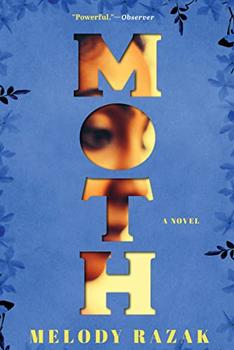Summary | Excerpt | Reviews | Beyond the Book | Readalikes | Genres & Themes | Author Bio

A Novel
by Melody Razak
"What did they make the hole with?"
"A screwdriver?"
"How long till he was dead?"
"A few days I think," whispers Alma, her hand cupped to her sister's ear. "It's called torturing."
"Tor-tur-ing?"
"To inflict pain as slowly as possible. Now go to sleep."
"Oh," says Roop, eyes wide. She tries to picture the pool of blood, its size and colour, spreading around the dead man's feet. "Can you tor-ture a mouse?"
"Shh. Close your eyes. I mean it."
"Can you torture insects?"
"Probably, but you mustn't. Baby Jesus would not like it one bit. Let's go to sleep."
Alma blows out the candle and turns her back. Eventually, she falls asleep with the distant lullaby of the muezzin singing the azan. She dreams of the river Jamuna flowing the wrong way and on its sandy shores stands the so-fair-boy. He looks up at her and waves.
* * *
Bappu listens to the news every day. Obsessively so, in fact. The Emerson Radio Model 517 has been taken out of his study and placed on one of two teak tables in the courtyard. The tables, a low table and a dining table, are made from British Burmese teak by an Indian carpenter to European specifications, "Made-in-India" is scratched into the underbelly of each one.
When he goes to work at Delhi University, Bappu listens to his colleagues. Every day at noon, the male teachers sit down at the canteen's communal table for a lunch of rotis-dal-sabzi. Some eat with their hands, others use a tin spoon bent out of shape. They pass round a steel pitcher of water.
Ma, also a teacher at the university, eats her lunch in a separate, windowless room with those nominal female students who are allowed, by the grace of their generously wealthy families, to attend. Both Bappu and Ma agree that the situation is unfair.
In the main canteen, the Congress-supporting Mr. Viamika, a muffler round his neck, comments one late February Monday, between mouthfuls of dal scooped up with a roti, that albeit Pandit Nehru is doing the best he can, he shouldn't be trying to please everyone. "It is a question of loyalty," he says, loud enough so the students will hear.
"Haan ji," agrees his close colleague, passing the chilli, the red thread of several pujas tied to his wrist, "all this pandering to the League haramzadas, when they are butchering our brothers."
Professor Singh stands to attention, holds up a finger, and lisps, straight from Tara Singh's mouth: "If the Muslim League want to establish Pakistan they will have to pass through an ocean of Sikh blood first. Our people will not forfeit Punjab without a fight," he adds, mumbling and swallowing. "Punjab is blessed land, richest agricultural soil on the subcontinent."
"Hear, hear," shout a few of the students, clapping and stamping their feet.
"Do not think for a minute," says the usually calm professor of Botanical Studies, Mohammed Ghualam, now incensed, "that we will stay in a country where we are clearly a minority and treated as such. Pakistan is a holy land. It has been promised to us by Allah and it will be delivered."
Mohammed Ghualam is one of five Muslim teachers in the predominantly Hindu—but proudly open-minded—institution.
Mr. Viamika slams his fist on the table. "All this rioting and raping," he glowers. "Your people are butchers. Do not think for a minute we have forgotten the events in Calcutta."
"We have not forgotten those in Noakhali," retorts Mohammed Ghualam, standing up quickly, spilling hot chai all over his trousers.
Bappu rubs his eyes—they always sting nowadays—adjusts his glasses, and passes his handkerchief to Mohammed Ghualam. He wishes Ma was sitting next to him. "We are old friends and colleagues," he says, looking from one teacher to the next. "We have worked together for years. We can't fight amongst ourselves. Not now."
Excerpted from Moth by Melody Razak. Copyright © 2022 by Melody Razak. Excerpted by permission of Harper. All rights reserved. No part of this excerpt may be reproduced or reprinted without permission in writing from the publisher.
Our wisdom comes from our experience, and our experience comes from our foolishness
Click Here to find out who said this, as well as discovering other famous literary quotes!
Your guide toexceptional books
BookBrowse seeks out and recommends the best in contemporary fiction and nonfiction—books that not only engage and entertain but also deepen our understanding of ourselves and the world around us.